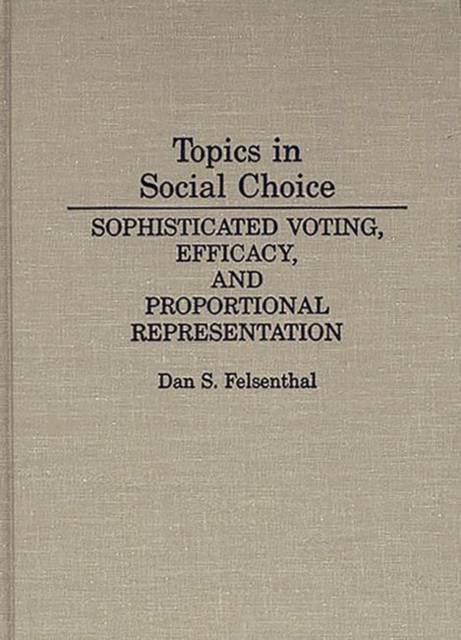
- Retrait gratuit dans votre magasin Club
- 7.000.000 titres dans notre catalogue
- Payer en toute sécurité
- Toujours un magasin près de chez vous
- Retrait gratuit dans votre magasin Club
- 7.000.0000 titres dans notre catalogue
- Payer en toute sécurité
- Toujours un magasin près de chez vous
Topics in Social Choice
Sophisticated Voting, Efficacy, and Proportional Representation
Dan S FelsenthalDescription
Based on a four year research project investigating voting behavior, Topics In Social Choice begins with the well-known premise that different voting procedures may lead to different outcomes. The author then fills a void in present literature by comparing voting procedures in terms of four issues: sophisticated versus sincere voting; sophisticated voters and simultaneous versus sequential voting; voter efficacy in plurality and approval voting; and the use of normative standards to compare outcomes. He proposes both a new model of sophisticated voting and normative standards for proportional representation procedures. This study addresses both the general reader interested in voting issues and the serious student of voting schemes, voting behavior, and social choice theory.
Topics In Social Choice is divided into three parts representing its three themes. It addresses theoretical and experimental aspects of sophisticated voting; the problem of efficacy and correct decision; and it concludes with an investigation of fair proportional representation. The volume represents the first attempt to address sophisticated and yet simultaneous voting. It is also the first to subject various voting models to competitive testing and provide a set of normative criteria for systems evaluation.Spécifications
Parties prenantes
- Auteur(s) :
- Editeur:
Contenu
- Nombre de pages :
- 232
- Langue:
- Anglais
Caractéristiques
- EAN:
- 9780275934309
- Date de parution :
- 23-05-90
- Format:
- Livre relié
- Format numérique:
- Genaaid
- Dimensions :
- 155 mm x 247 mm
- Poids :
- 526 g

Les avis
Nous publions uniquement les avis qui respectent les conditions requises. Consultez nos conditions pour les avis.






